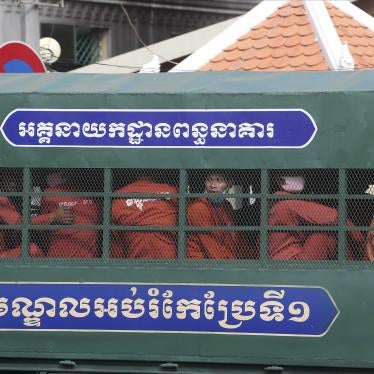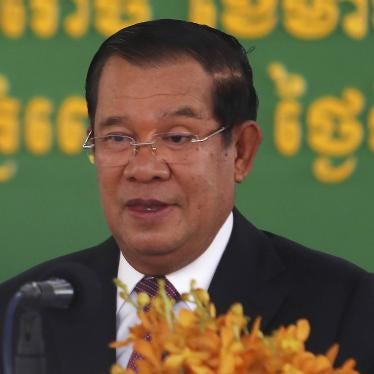(Bangkok) – The Cambodian authorities should immediately stop abusing public health measures to repress workers’ right to strike and other basic rights, Human Rights Watch said today.
Since the Labor Rights Supported Union of Khmer Employees of NagaWorld (LRSU) went on strike in December 2021 to call for the reinstatement of workers laid off earlier in the year, Cambodian authorities have arbitrarily arrested, detained, and prosecuted union activists. Most recently, the authorities have sought to justify these criminal charges as Covid-19-related measures. On February 5, 2022, the police arrested six union members at Phnom Penh’s NagaWorld casino as they left a Covid-19 testing site and baselessly charged three of them with obstructing the government’s Covid-19 efforts.
“The Cambodian authorities are stooping to new lows by bringing criminal charges in the guise of public health measures to end a strike,” said Phil Robertson, deputy Asia director at Human Rights Watch. “The government’s persecution of union activists appears aimed at blunting the growing unity and strength of Cambodia’s union movement and their support for the NagaWorld strikers.”
On February 4, Cambodia’s Health Ministry ordered several hundred workers engaged in a strike action outside the NagaWorld casino to take a Covid-19 test, after one striking union member (who had last participated in the strike on January 15) tested positive. The authorities said that anyone who tested negative would have to self-isolate for seven days, and that if they tested positive, they would be sent to a Covid-19 treatment center. Between February 5 and 6, over 400 protesting workers appeared as ordered at the designated testing site on Phnom Penh’s Diamond Island (Koh Pich). Since the strike began, protesters have protected themselves and others by wearing masks and maintaining social distancing.
The six arrested on February 5 were Seng Vannarith, Choub Channath, Sao Sambath, Ouk Sophorn, Touch Danet, and Em Kunthea. The police released Sophorn, Danet, and Kunthea later that night, but held Vannarith, Channath, and Sambath at the Phnom Penh police headquarters. On February 9, the Phnom Penh court charged the latter three with “obstruction of Covid-19 measures” (article 11 of Cambodia’s Covid-19 law), which carries a penalty of up to five years in prison. The court ordered their pretrial detention at Phnom Penh’s Police Judiciaire prison facility, which in November 2020 was at about 170 percent capacity.
On February 5, the authorities issued summonses for four other workers for questioning about alleged obstruction of Covid-19 measures. The four had followed government orders by getting tested for Covid-19 and self-isolating after testing negative. One of the four told VOD News that she was “shocked” to receive a summons because she said she “didn’t incite people to block testing.” Another feared that she would be found in violation of Covid-19 measures if she left self-isolation to appear in court.
“Throwing workers into overcrowded jails that are hotbeds for Covid-19 as they await criminal trial shows that the government’s concern is not about public health but about ending one of Cambodia’s longest industrial actions in years,” Robertson said.
On December 18, LRSU began the strike in accordance with international labor law, calling for the reinstatement of 365 employees previously dismissed as part of the mass layoff of 1,329 workers by Phnom Penh’s NagaWorld casino in April 2021. Among those dismissed were union leaders. The authorities called the strike “illegal” on the basis of a court order issued on December 16 that violated the right to strike protected under international law. The authorities ordered protesters to resume work, contending that if they did not, NagaWorld would be permitted to terminate them. The government has failed in achieving a fair resolution in the labor disputes between NagaWorld and the union.
Since December 31, the authorities have arrested dozens of LRSU members who participated in the strike, and already jailed eight, including the union president, Chhim Sithar, on “incitement” charges. They are held at Phnom Penh’s Correctional Centers 1 and 2.
The Cambodian government adopted the Law on Measures to Prevent the Spread of Covid-19 and other Serious, Dangerous and Contagious Diseases in March 2020. Human Rights Watch has repeatedly highlighted the threat the law poses to human rights in Cambodia because the authorities can easily abuse its overly broad and vague provisions. The law also fails to provide any independent oversight and procedural safeguards, and provides disproportionate fines and penalties of up to 20 years in prison for alleged violations of Covid-19 related measures.
The United Nations special rapporteur on Cambodia reported that, between March and October 2021, the police arrested over 700 people based on allegations of having violated Covid-19 measures. Some of the alleged violations of the Covid-19 law involved people making critical commentary on social media about the government’s handling of the pandemic.
Cambodia is bound by Convention No. 87 of the International Labor Organization (ILO) and the UN International Covenant on Civil and Political Rights, which protects the right to strike. The ILO tripartite Committee on Freedom of Association held that prohibitions of strikes during a national emergency, such as the Covid-19 public health crisis, should be limited in time, strictly necessary, and proportionate. The committee also stated that the “responsibility for suspending a strike on the grounds of public health should not lie with the government, but with an independent body which has the confidence of all parties concerned.”
The LRSU protesters’ precautionary health measures made the denial of the strike and the subsequent arrests unnecessary, excessive, and disproportionate, violating their internationally protected right to strike, Human Rights Watch said.
“Using public health measures to repress workers undermines the public’s faith in the government’s actions against Covid-19,” Robertson said. “UN agencies in Cambodia, the ILO, and foreign embassies should press the government to immediately and unconditionally release the detained union activists and stop abusing health measures for political ends.”








